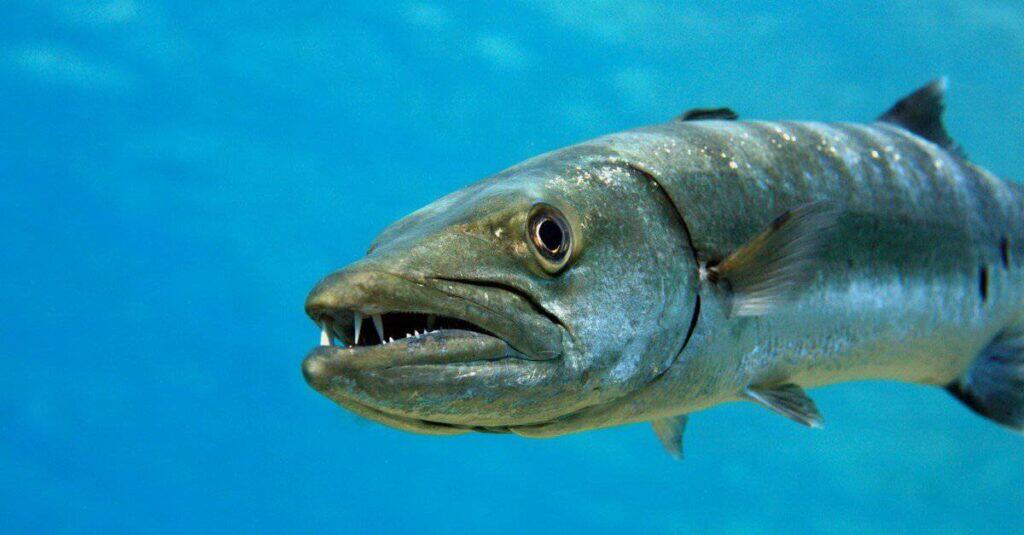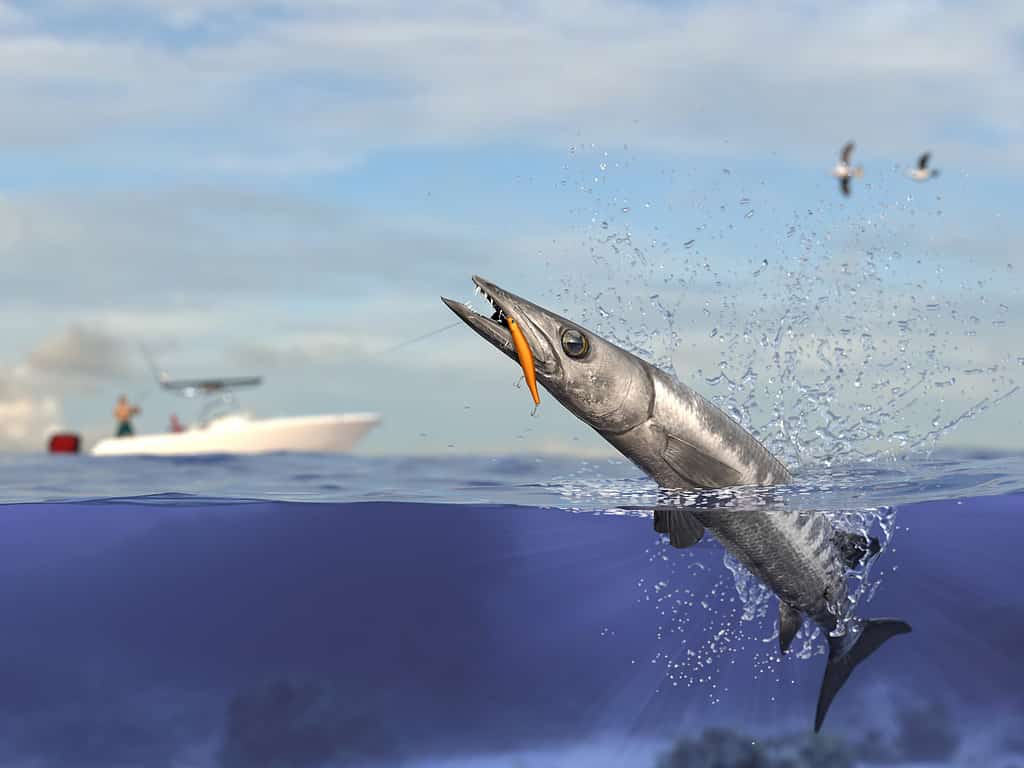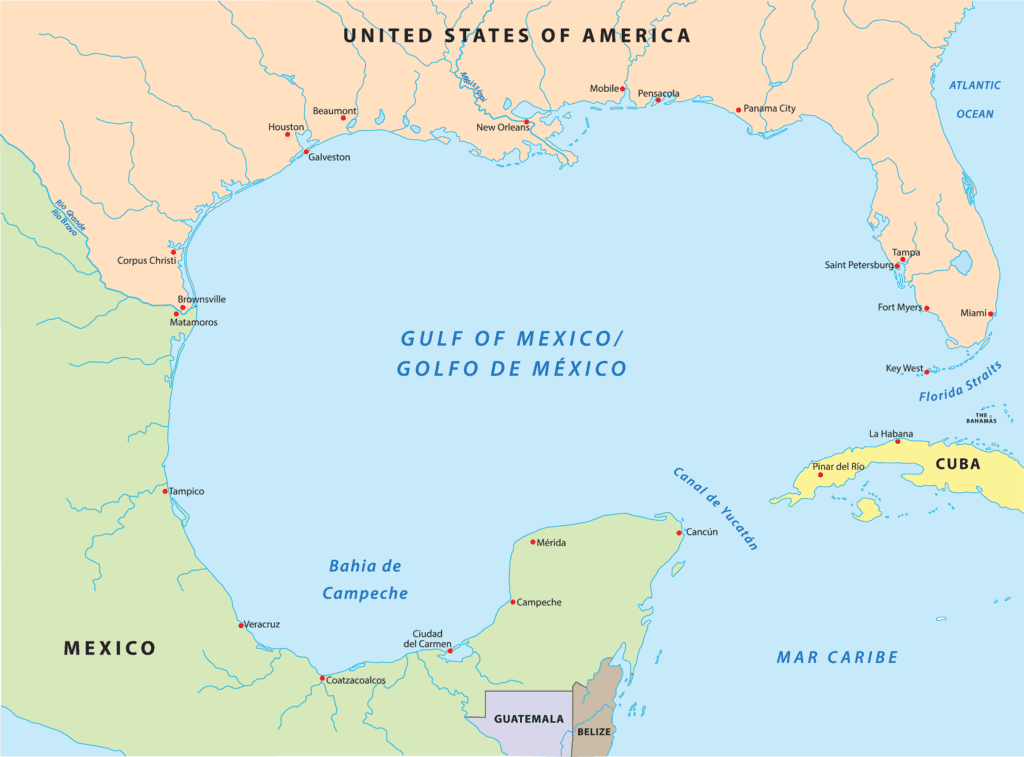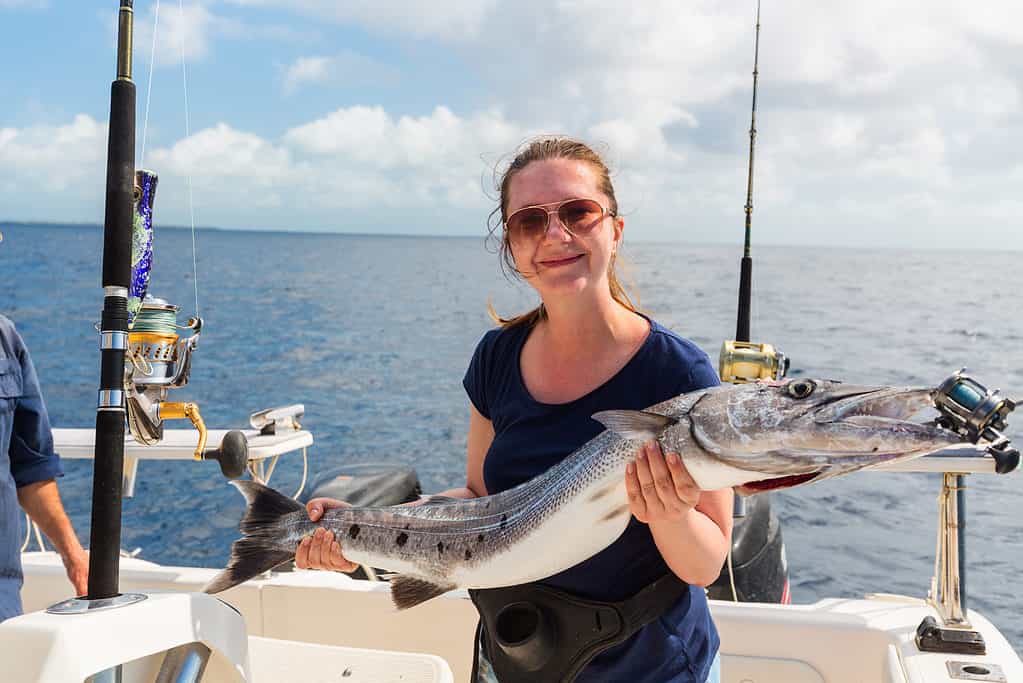Louisiana‘s passion for fishing is no secret. From the coastal regions to inland lakes, it’s an activity many across the state enjoy. And while the waters of Louisiana are home to a variety of species of fish, one stands out above the rest — the great barracuda. This powerful fish can grow to impressive sizes, and the record in Louisiana is no exception. We’ll take a closer look at the largest great barracuda ever caught in Louisiana and the angler who managed to land this impressive catch.
What’s A Great Barracuda?
The great barracuda, scientifically named Sphyraena barracuda, grows up to 5 feet long and can weigh over 100 pounds. It earns the nickname “Tiger of the Sea” for its razor-sharp teeth and powerful jaws.
This fish commonly preys on smaller fish and squid and inhabits coastal waters and coral reefs. Sports fishermen highly seek it for its impressive size, strength, and fierce fighting abilities.
There are 29 species of barracuda in the Sphyraena genus, which is part of the Sphyraenidae family. The Greek name Sphyraena means ‘hammer fish,’ reflecting their head-on attack style. The barracuda is related to sailfish, marlin, swordfish, and spearfish from the Xiphiidae and Istiophoridae families.
What Is The Physical Description Of A Great Barracuda?
The great barracuda is not just big, but it’s also colorful. It can be blue, green, or brown, with silver on the sides and white on the belly. Young barracudas can change their color to blend in with their surroundings to stay safe. When young, they have a stripe from head to tail, which turns into dark spots or bars as they grow.
The great barracuda’s lower jaw sticks out more than its upper jaw and has two teeth. The inside teeth are long and sharp for grabbing prey, while the outside teeth are small and sharp for ripping flesh.
This fish has two dorsal fins. The first has five sharp spines, and the second has one spine and nine soft parts. Both are above the fish’s pelvis, and the second dorsal fin is just as big as the anal fin! It also has a lateral line that runs from its head to its tail. The great barracuda’s tail fin can be forked or curved and sits on a thick part of its body called a peduncle.

Great barracudas are called “Tiger of the Sea” for their razor-sharp teeth and powerful jaws.
©aquapix/Shutterstock.com
What’s The Behavior Of The Great Barracuda?
Great barracudas are fierce predators that stalk their prey in the open ocean. They may not be the most agile hunters, but they make up for it with lightning-fast bursts of speed, reaching up to 36 mph (58 kph).
While they prefer to hunt solo, young barracudas love to hang out in gangs. These fish can survive for at least 14 years and mate from April to October. Females can lay an enormous number of eggs — anywhere from 5,000 to 30,000 at once!
During their juvenile stage, they like to stay in the protected surroundings of seagrass and mangrove habitats for about a year. Once they become sexually mature, typically at three years for males and four years for females, they migrate toward deep reef zones. They will live in these zones for the rest of their adult lives.
What Is The Diet Of The Great Barracuda?
Their diet consists mainly of fish and squid, with the occasional shrimp thrown in for good measure. When a big barracuda has had its fill, it may lead a school of fish to shallow waters to keep them safe while it takes a break before its next hunt. This clever tactic helps them keep a steady supply of prey in reserve.
Is It Possible For Barracudas To Cause Harm To Humans?
Barracudas are opportunistic scavengers and can mistake snorkelers for large predators, following them to grab their leftovers. They can bite swimmers when visibility is low, though it rarely happens. Shiny objects like earrings or knives can also trick barracudas into thinking they’re food. Despite this, barracudas typically don’t attack humans, but if they do bite, it can result in cuts and tissue loss. Fishing enthusiasts enjoy catching them because they put up a fierce fight.
What Is The Largest Great Barracuda Ever Caught In Louisiana?
1. A.C. Mills
In August 1970, A.C. Mills accomplished a remarkable feat. He caught a great barracuda that weighed a staggering 50 pounds — the largest ever seen in Louisiana. However, it’s unclear where exactly he caught it, as online sources don’t mention the location.
Mills’ achievement solidified his status in Louisiana’s fishing history. Even now, his record remains unchallenged, and his name is still highly respected among Louisiana’s angling enthusiasts.
2. Dylan M. Corsentino
Nearly 45 years later, in August 2014, Dylan M. Corsentino caught another great barracuda in the Gulf of Mexico. This one weighed 49.14 pounds and ranks as the second-biggest great barracuda caught in Louisiana today.
3. Rhonda Green
Rhonda Green caught a great barracuda weighing 48.50 pounds in July 1981. Although the location where she caught the fish is unclear, it is safe to assume that she caught it somewhere off the coast of Louisiana.
4. Dr. T. Kramer
In October 1975, Dr. T. Kramer caught a great barracuda weighing 48.0 pounds, most likely somewhere in the Gulf of Mexico.
5. Clarence Foret, Jr.
In June 2001, Clarence Foret, Jr. reeled in a massive barracuda weighing 47.75 pounds off Grand Isle/Blk. 76. This impressive catch has secured a spot in Louisiana’s record books as the state’s fifth-largest great barracuda ever caught.
6. Dennis L. January, DDS
Dennis L. January, DDS, caught a great barracuda weighing 47.50 pounds in Main Pass in April 2003. This catch ties for the sixth most enormous great barracuda caught in Louisiana on record.
7. Lester L. Jay
In August 1972, Lester L. Jay caught a great barracuda weighing 47.50 pounds, but it’s unclear where he caught the fish.
8. Peter E. LaRosa, Jr.
In August 1988, Peter E. LaRosa, Jr. caught a great barracuda weighing 46.0 pounds. Unfortunately, it is unknown where he caught the fish.
9. Danny Jackson
In May 2001, Danny Jackson caught a great barracuda weighing 46.0 pounds in W. Delta Blk. 152. This catch ties with Peter E. LaRosa, Jr.’s catch as the record’s seventh biggest great barracuda caught in Louisiana.
10. Jep E. Turner, Jr.
Finally, Jep E. Turner, Jr. caught a great barracuda weighing 44.50 pounds in September 1968. This catch rounds out the top 10 biggest barracudas ever caught in Louisiana.

In August 1970, A.C. Mills caught a great barracuda that weighed a staggering 50 pounds — the largest ever seen in Louisiana.
©iStock.com/bbevren
What Is The Biggest Recorded Great Barracuda Ever Caught Globally?
In 2013, Thomas Gibson, an angler from the United States, caught the biggest official barracuda ever recorded worldwide. He hooked it in the Kwanza River located in Angola, southern Africa. The colossal Guinean barracuda weighed 102.8 pounds and measured over six feet ten inches long.
Previously, Dr. Cyril Fabre held the world record for catching a 101.3-pound barracuda in Gabon, Africa, in 2002. But Gibson surpassed him by catching a bigger barracuda using light tackle spinning, a 10-pound braided line, and Rapala lures.
Gibson was amazed by his good fortune, as the entire process of reeling in the behemoth barracuda took only ten minutes. Initially, he had no clue what he had caught, but when he finally saw it, he said it looked like a legless crocodile!
What Are The Best Places To Catch Great Barracudas In Louisiana?
People often find barracuda near reefs, wrecks, oil rigs, or submerged mini-mountains. Here are some of the best places to catch great barracudas in Louisiana.
Grand Isle
This barrier island is a popular spot for anglers looking to catch barracuda. The island is located on the Gulf of Mexico and is known for its deep-sea fishing opportunities. Aside from barracudas, you can catch many other types of fish off the coast of Grand Isle, such as redfish, speckled trout, and yellowfin tuna.
Venice
Venice is a small town situated at the mouth of the Mississippi River. It is renowned for its huge fish and is considered one of the leading offshore destinations. The Mississippi River formed Venice’s land and carved a deep seafloor channel, offering excellent fishing opportunities. As a result, Venice is often called the Tuna Capital of the Gulf and is a must-visit destination for anglers looking to catch barracuda and other saltwater fish.
Lake Pontchartrain
This large brackish lake in southeastern Louisiana is a popular spot for freshwater and saltwater fishing. The body of water is not really a lake but more of a tidal lagoon. The Rigolets, a narrow passage east of Lake Borgne, connects it to the Gulf of Mexico. The water in this lagoon is a bit salty. Still, the floodwaters from the Mississippi River, which pass through a structure called the Bonnet Carre Spillway, can significantly reduce its saltiness. As a result, people can often catch barracuda in the deeper parts of the lake.
Gulf of Mexico
The Gulf of Mexico is a large body of water located off Louisiana’s coast. It is home to a wide variety of fish species, including barracuda. Anglers can take a charter boat to the Gulf to catch barracuda and other saltwater fish.

Anglers can take a charter boat to the Gulf of Mexico to catch barracuda and other saltwater fish.
©Rainer Lesniewski/Shutterstock.com
Where Is Louisiana Located On A Map?
Louisiana is located in the southern part of the United States. It is bordered by Texas to the west, Mississippi to the east, Arkansas to the north, and the Gulf of Mexico to the south. Arcadia is located in the northern part of the state, between Monroe and Shreveport.
What Are The Health Benefits Of Barracuda?
“There is plenty of fish in the sea,” but for those who want a lean, mean, high-protein option with a touch of sweetness, barracuda is the real deal! In tropical and subtropical regions, people go wild for barracuda, and it’s no wonder why.
This fish packs a punch with its firm white flesh and a healthy dose of omega-3 fatty acids. With all these benefits, it’s no surprise that barracuda remains a popular pick for seafood connoisseurs worldwide.
Can You Get Sick From Eating Barracuda?
Yes. According to the CDC, barracudas are the most dangerous predatory fish to eat. This is because they live near reefs, where they have a higher chance of carrying Ciguatera fish poisoning. The toxin called ciguatoxin causes Ciguatera fish poisoning. While it can cause many unpleasant symptoms, it is seldom lethal.
Certain algae in deep tropical waters produce ciguatoxin, a poisonous substance. The toxin originates from a tiny organism known as dinoflagellate that grows on different types of algae. Barracudas, being carnivorous, don’t directly eat the contaminated algae. Instead, they eat small fish, such as herring and tuna, that have consumed the algae. When barracuda eat fish with ciguatera toxin, they accumulate it in their body. Their flesh, fat, and viscera store the poison.
The barracuda is immune to ciguatoxin. But consuming infected barracuda can lead to unpleasant results for most people. Symptoms can appear within a day and include:
- Nausea and dizziness
- Vomiting
- Diarrhea
- Tingling
- Vertigo
- Abdominal pain
- Lasting damage to nerves and the cardiovascular system
The Louisiana Department of Health and Hospitals states that Ciguatera fish poisoning is a rare occurrence that only affects a small fraction of individuals. Only 5 to 70 out of every 10,000 people are affected annually. In 1997, the CDC reported that 17 crew members on a ship near the Texas coast became sick after eating barracuda.
Can Ciguatera Be Cured?
Ciguatera symptoms have the potential to persist for several days or even months. Unfortunately, this condition has no cure, although certain symptoms can be treated. To prevent a recurrence of symptoms, individuals who have recovered from ciguatera are advised to abstain from consuming fish, alcohol, caffeine, and nuts for a minimum of six months.
Is Barracuda Fish High In Mercury?
The good news is that barracuda usually has low to moderate levels of mercury. This means it is generally safe to eat and poses no significant health risks associated with high mercury levels. However, larger barracudas can contain more mercury than smaller ones. Therefore, when possible, it is essential only to buy sustainably sourced barracuda to ensure low levels of mercury.
Is It An Endangered Species?
The great barracuda population is steady and not classified as endangered. However, this fish faces various hurdles from predators like sharks, dolphins, and killer whales. It also deals with destroying seagrass beds and mangrove habitats, coral reef degradation, and ocean acidification. Additionally, overfishing increases the likelihood of entanglement in fishing nets, and accidental collisions occur with boats.
What Are Some Responsible Fishing Practices For Catching Great Barracuda?
- Use catch-and-release methods whenever possible to reduce the impact on the fish population.
- Avoid stainless steel hooks that can damage the fish’s mouth and make it harder to remove the hook.
- Use circle hooks instead of traditional J-hooks, as they reduce the risk of injury to the fish and increase the chances of a safe release.
- Using barbless hooks to make removal easier and reduce damage to the fish’s mouth and surrounding tissue.
- Follow fishing regulations and limits to ensure the fish population is not overexploited or endangered.
- Avoid fishing in spawning or congregating areas to allow the fish to reproduce and maintain their population levels.
- Use non-toxic and biodegradable gear to minimize the environmental impact of your fishing activities.
- Practice responsible boating techniques to reduce disturbances to the marine environment and prevent accidents.

Fishing enthusiasts enjoy catching great barracudas because they put up a fierce fight.
©BlueOrange Studio/Shutterstock.com
The Harmless Great Fish
The great barracuda is a true predator of the seas, reigning supreme in the coastal waters of Louisiana. This remarkable fish is as tough as nails, boasting an impressive size, Herculean strength, and a killer instinct that puts even the most seasoned anglers on edge.
While the great barracuda has a reputation for being a bit of a wild card, prone to causing a stir in the waters, it’s mostly all bark and no bite. These opportunistic scavengers would rather be caught dead than attack a human.
The photo featured at the top of this post is © Itstvan Kovacs/Shutterstock.com
Thank you for reading! Have some feedback for us? Contact the AZ Animals editorial team.






